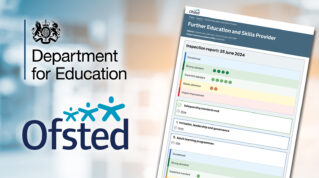Ofsted’s proposed changes seek to deliver a more nuanced view about the quality of provision, to address concerns about the high stakes nature of inspections and the potential stress the inspection process involves. So have they got it right?
At Blackpool and the Fylde College, we are somewhat concerned that switching from a single judgement to a balanced scorecard will make inspection more onerous and difficult to understand. This could potentially be confusing for parents and students. We’re also concerned about what is now meant by ‘inclusion’ – a word which still lacks a clear consensus. So we’re interested to see what the consultation brings.
However, we are supporters of the inspection process itself – and see two issues as critical.
Consistency
First is the need for Ofsted to be consistent. We’ve seen significant improvements in recent years, particularly a focus on the learning process and students’ progress. In FE, it’s welcome that inspections are much more demanding in terms of pedagogical practice, curriculum design and delivery, and support for teachers than they were in the noughties.
Two areas of weakness in any inspection process are faddishness and behaviour – and these appear to have been problems in recent high-profile cases. The issues at Caversham Primary School seemingly arose around a particular interpretation of safeguarding which escalated into an adversarial inspection. Ofsted has a responsibility to ensure this doesn’t happen, so professionals can trust the process and the temperature doesn’t reach boiling point.
At our inspection in February, it was clear Ofsted is making significant progress in this respect. Their team was well-led, transparent, communicated clearly and behaved reasonably throughout. Senior leaders, including board members, all found them engaged and willing to listen.
Frontline teachers and support staff reported that they actually enjoyed their interactions with inspectors and found it to be an excellent learning experience.
Mick Bullock, our automotive operations manager, praised the “collaborative atmosphere…appreciated by all involved”.
Mary Roberts, advanced practitioner for access and continuing education, hosted three deep dives. During these, she “felt like the inspectors and I were on equal footing…a refreshing and empowering experience” compared previous inspections over her 19 years in FE.
Leaders must change too
But it is not all down to Ofsted to change. Leaders must do the same.
Too often, pre-inspection tension comes from the top with senior managers actively spreading totally unnecessary anxiety amongst colleagues.
One of a leader’s responsibilities is to be the lightning conductor: absorbing the shocks so others can get on with their job safely and securely. There’s no point getting stressed when Ofsted knocks at your door. They will see the results of work which honestly should have been in place for months, if not years, before.
We’ve had an internal conversation about improvement every day since the previous inspection. What’s truly important is setting out our own purpose, mission and standards around the quality students, apprentices and employers should expect.
We’ve defined standards of teaching, learning and assessment for ourselves, and have a methodology for embedding effective practice. We found the Walkthrus techniques, combined with our own performance system, to be particularly useful.
We don’t see Ofsted as our reason for being. But we use their handbook as a checklist to ensure our plans for student experience are aligned.
Since 2019, the inspection framework has been more focussed on the learning process (curriculum intent, implementation and impact) rather than performance data per se. This reflects our own approach, so the potential for dissonance is lower.
When ‘the call’ comes, we aim to make it a “low stakes” moment. Instead of asking people to work late and over the weekend, we encouraged them to go home early and enjoy their time beforehand. This helped them feel confident about showing inspectors what they do. And they delivered.
Sam Bailey, our head of people, heard from many teams that their experience was seen as a moment of “collective pride”.
“Colleagues felt trusted in what they do every day delivering excellence for learners”, she said. “They felt that psychological safety to say, ‘this is excellent, but this over here is something we want to improve’. There was no fear factor or panic, just genuine excitement to show what we do and the impact it has.”
















Your thoughts